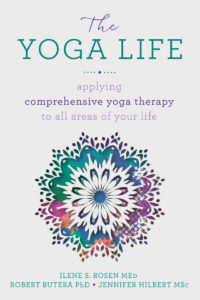An Introduction to The Yoga Life
The Yoga Life: Applying Comprehensive Yoga Therapy to All Areas of Your Life
by Ilene S. Rosen M.Ed, Robert Butera, PhD and Jennifer Hilbert, M.Sc.

Introduction to The Yoga Life
Comprehensive Yoga therapy is holistic lifestyle education derived from classical yoga that restores balance to our physical, mental, emotional, and spiritual health. It is a system that teaches us how to compassionately evaluate the beautiful intricacy of our whole being and identify how to remove obstacles to health. This holistic perspective upholds that all parts of a human being share equal importance. Scientific and medical perspectives have demonstrated the benefits of understanding a body part or system independent of the whole. Using both models together—holistic and scientific/medical— expands the realm of potential for our health by drawing on the wisdom of ancient practices and modern innovations. In this way, Comprehensive Yoga therapy works in conjunction with medical and allopathic approaches to healing and advocates for holistic modalities such as naturopathy, chiropractic, osteopathy, Ayurveda, and psychological counseling. It is based on the guidance of ancient yogic texts, specifically the Yoga Sutras, the Upanishads, and the Bhagavad Gita, in addition to modern medical discoveries.
What Is Comprehensive Yoga Therapy?
Yoga therapy is different from other kinds of therapy, which aim to treat the symptoms of diseases, and it is also dissimilar to yoga classes, wherein participants follow a sequence of poses led by the teacher. The word yoga means “unity,” and yoga poses are one part of this unification process. According to the Yoga Sutras, one of the primary texts of yoga, “Yoga is the stilling of the waves of the mind” (chapter 1: 2). In popular Western culture, yoga is considered to be movements or postures to increase strength and flexibility; how- ever, the original intention of these postures was to create inner steadiness and comfort for the purpose of transcending all dis-ease and uniting with pure consciousness (Yoga Sutras, chapter 2: 46–48). Postures are applied in conjunction with ethical and moral principles, breathing exercises, mastery of sensory stimulation, mental focus, meditation, and connection to a state of pure peace. When such a comprehensive plan is followed, people report greater health, not just in their bodies but also in relationships, emotions, thoughts, and overall sense of connection to goodness in their lives. In the chapters that follow, you will learn how to apply the whole system of yoga to each area of your life.
Yoga therapy is a highly personalized and therapeutic experience focused on the client’s goals. When done in a private session with the guidance of a certified yoga therapist, clients explore various elements of the entire system of yoga. Depending on the client’s goals and preferences, yoga therapy sessions include a mixture of discussion, education on lifestyle, yoga philosophy and direct experiences, yoga poses, breathing exercises, guided relaxation, meditation, and grounding methods. Common goals for individuals seeking yoga therapy include but are not limited to lifestyle changes; optimal health; disease management; eliminating or managing stress, pain, and emotional distress; mental health, and spiritual growth. The exercises in the opening chapters of The Yoga Life will help you clarify your health goals and guide you through an individualized approach to realizing your personal, unique goals.
The field of yoga therapy is increasingly recognized as a scientifically valid approach to physical and mental health. More and more, medical and mental health physicians are referring clients to yoga classes and yoga therapy for a variety of reasons, most commonly to manage stress, anxiety, and pain. Breathing exercises can help calm anxiety, slow down spinning thinking, and cultivate presence and mental clarity. Yoga poses build mental and physical strength and can help lead to more comfort in and appreciation for one’s bodies. The movements can also be rehabilitating, easing, and healing for pain. Improvement in mood and self-esteem often occur as the yoga practices developed in session are carried into daily life, creating a sense of personal empowerment in one’s wellness. The core yoga philosophies of kindness, compassion, and acceptance (to name just a few) are extremely valuable for reframing self-limiting beliefs.
As an integrative system of amplifying and restoring health, the Comprehensive Yoga therapy process educates about how to make clinically proven healthful choices about work, nutrition, rest, relationships, movement, and thoughts. Healthful choices combined with the balancing nature of yoga practices can reduce stress and internal inflammation, slow physical degeneration, amplify the immune response, help regulate gland and organ functions, clear and balance the vital energy, and increase range of motion and pain-free mobility.
The principles and practices of Comprehensive Yoga therapy described in this book teach a non-prescriptive, unifying approach to health. They also offer a lens through which to view yourself as a whole human being with unique qualities, each one contributing to your overall health in meaningful ways. By considering lifestyle, personality, history, and the mind-body relationship, Comprehensive Yoga therapy expands the definition of health to encompass a whole-person point of view. This means all areas of your life contribute to your health. Did you know your attitudes about finances, work, and relaxation contribute to your health? Or that laughter and hobbies are just as important to include in your daily life as is movement and a wholesome diet? It’s true!
A Whole Person Approach
Exploring your own health with this whole-person approach will help you integrate a more comprehensive approach to wellness. This book highlights how the field of yoga connects each part of a human being in a context of the other. In other words, you can’t study one system of the body or aspect of your life without learning from the others. Comprehensive Yoga therapy is designed to help you cultivate health and harmony in all areas of your life.
Ultimately, yoga teaches us to seek inward, for inside resides the answers to how to live our fullest, most vital life. The Yoga Life empowers you to compassionately evaluate the beautiful intricacy of your whole being and identify how to remove obstacles to health, so that you can cultivate more vitality to support your physical, emotional, mental, and spiritual wellness.
Comprehensive Yoga therapy offers a foundation upon which you may reclaim your health and attend to your whole self. This includes being proactive or empowered to take control of the lifestyle factors that predispose you to ailments. It also includes being participatory or engaged in effecting positive change in all areas of your life. And finally, the program is personalized, allowing you to view yourself as an individual and receive personally meaningful tools designed to support your physical, mental, intellectual, and spiritual health. Each of these points emphasize the personal power you hold to create health in all areas of your life, and our book is designed to support you along the way.

